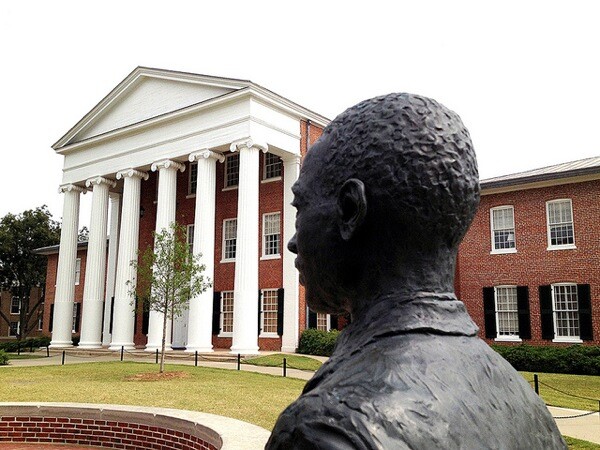Statue of Limitations: A Vandalized Civil Rights Monument Reveals the Unexpected

For the last several years, we've been hitting a lot of 50-year anniversaries of civil rights milestones, among them James Meredith's admission to the University of Mississippi as its first black student in 1962. This one gives me particular pause because that was the year I was born -- it's always humbling for me to think about the racially tumultuous times I was born into, but ultimately spared -- and because of the recent desecration of the memorial of Meredith on the campus of Ole Miss. This week, somebody put a noose around the neck of Meredith's bronzed statue, and just to drive home the point, draped the statue with the former Georgia state flag. The flag was redesigned in 2003 to rid it of it controversial image of the Confederate flag.
It's yet another sad but unsurprising reminder that racism and is alive and kicking, especially in the deep South where it enjoyed such a long and, in the view of many whites, successful run. In this country, racism follows the physical rule of all energy in the universe: it is neither created nor destroyed, it simply changes form.
What did surprise and sadden me more than a little was Meredith's own response to the incident, published this week in the L.A. Times. After blaming the vandalism on a general lack of love-thy-neighbor values espoused in biblical teachings such as the Ten Commandments, he then blamed other black people for moral laxity. "I've been knowing a long time that we aren't teaching our kids right and wrong," he was quoted, adding that it was "important to fix one's own family before trying to fix another's."
Huh? Talk about a non sequitur.
How in the world does Meredith go from talking about the clear lack of morals that fueled this lynching enactment to an alleged lack of morals in black communities that have absolutely nothing to do with that enactment? How does a figure like Meredith (or anybody, for that matter) get from white racism to black irresponsibility without even mentioning the first thing but elaborating on the second thing as if it was the root cause of everything? It's quite a trick that, alas, is not limited to Meredith.
Conversations about race and what to do about our remaining Negro problem have been running in this conservative direction for decades. And it comports with Meredith's own views: though an icon of the civil rights era, he is a lifelong Republican who never saw himself as part of the movement, just an individual black man seeking justice. That's fine. But to be unwilling or unable to condemn a blatant expression of white supremacy for what it is evidences a dangerous kind of denial that perpetuates our racial problems in the modern era.
It's possible that the Times article left out some context that might have made Meredith's remarks less bizarre, that the reporter highlighted his Bill Cosby-esque critique of black folks to the exclusion of some other things he said. But even if that's true -- and I doubt it is -- I don't see how the what's-wrong-with-black-people discussion fits anywhere into a story about a hateful crime -- if not actually a hate crime -- committed symbolically against a man who became world-famous for an act of real American heroism. To use the moment to talk about the deficiencies of black people so historically oppressed by Mississippi and other places is to trivialize history. Not to mention insulting.
And yet we insult and trivialize history all the time. Even in February, Black History Month. I wouldn't be surprised if the statue desecrators chose this time to do their deed for just that reason. I've always said that Black History Month is in some ways unobservable, because black history is still being written. It is a long ways from qualifying as something we can all look back and reflect on, still unfolding daily before our eyes with spectacular moments like the election of a black president, but more frequently with ugly moments like this. As far as we've come since 1962, the fact is that 1962 is not very far from us. I don't know about anybody else, but I'm still waiting to feel all grown up.